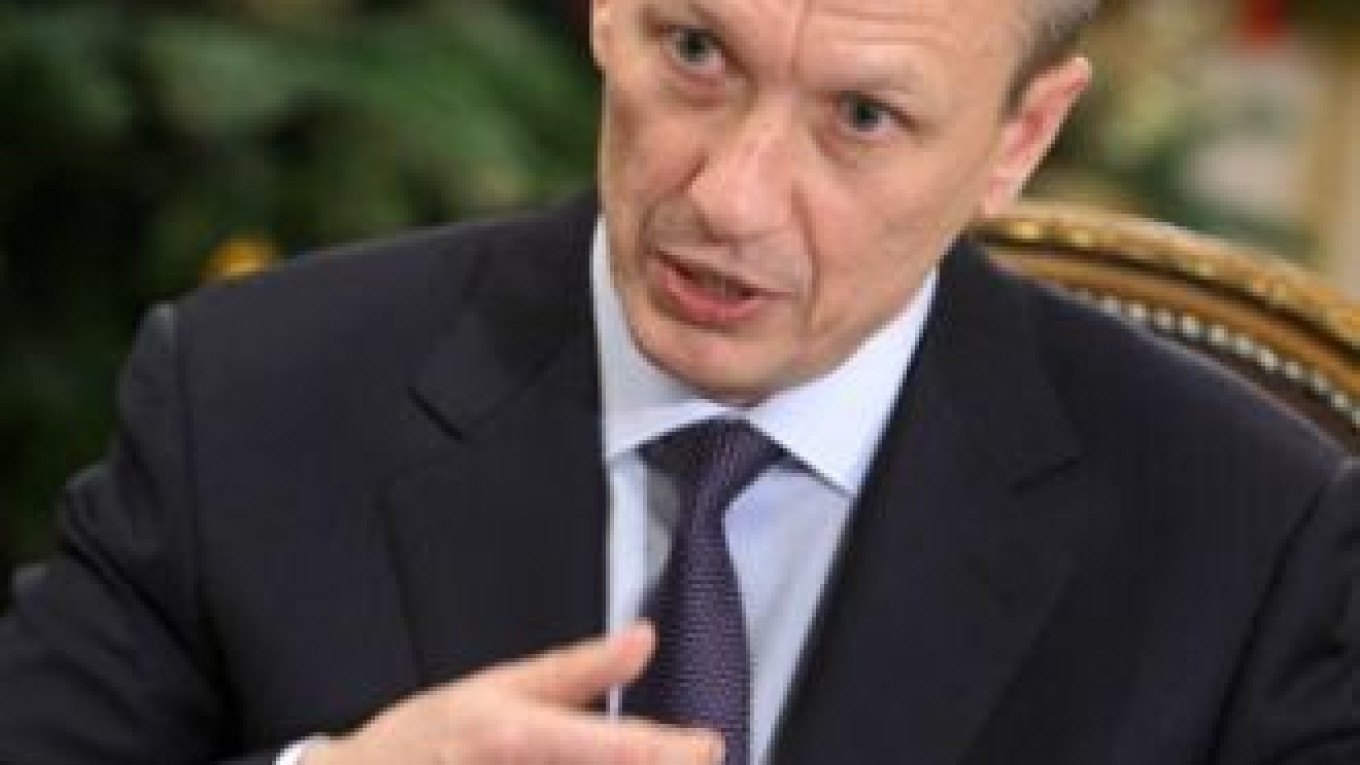The country’s first popular gubernatorial elections are due next month, but it is clear already that none of the five regions holding them will see political upheaval.
Only in two regions, Bryansk and Ryazan, the incumbents face a serious risk of losing the Oct. 14 elections, most probably to a Communist candidate, analysts say. The extra-parliamentary opposition, still hopeful to gain from the momentum of the massive anti-government protests, is not participating in any of the contests, focusing on regional legislative and mayoral elections instead.
“The system demands from any candidate to be totally subordinate to United Russia,” Mikhail Shneider, a senior official of the People’s Freedom Party, told The Moscow Times.
The opposition party, which is better known under its Russian acronym Parnas, only tried to field a candidate in the far eastern Amur region, but failed to submit the required number of municipal deputies’ signatures.
Then-President Dmitry Medvedev announced the reintroduction of popular elections for governors in December, in what was widely seen as a concession to that month’s mass protests. They had been abolished in 2004 by then-President Vladimir Putin. It was Putin who subsequently advocated stringent conditions for candidates wishing to run, which were duly approved by the State Duma this spring.
Dubbed the Kremlin filter, the requirement to collect signatures from 5 to 10 percent (depending on the region) of local deputies has been criticized as a tool to keep political competition low, because United Russia heavily dominates most of the country’s local legislatures.
“It is like climbing the Kremlin wall,” said Galina Mikhalyova, deputy head of the liberal Yabloko party. Yabloko managed to field a gubernatorial candidate in the Bryansk region only because of local party chairman Andrei Ponomaryov. “Andrei has been in the region so long, everybody knows him there,” Mikhalyova explained. She added that Yabloko did not attempt to field any other gubernatorial candidate.
Bryansk Governor Nikolai Denin, who has ruled the rural western region for two consecutive four-year terms, faces low ratings and four challengers, including candidates from the Communist Party, the Liberal Democrats and A Just Russia.
Pundits say that the strongest opposition candidate is Communist State Duma Deputy Vadim Potomsky and that he has a chance to oust Denin, who is also facing corruption accusations in connection with a poultry farm owned by his family.
Denin got a “C” rating in a four-tier ranking (A to D) of the five governors standing in the Oct. 14 elections, published by the Political Expert Group consulting firm and the Political Technologies journal.
The ranking gave “A” grades to three other gubernatorial candidates: Oleg Kozhemyako of the Amur region, Yevgeny Savchenko of the Belgorod region and Sergei Mitin of the Novgorod region.
Oleg Kovalyov of the Ryazan region got a devastating “D” rating, and most pundits agree that his chances of re-election are low, especially after it became known last week that more than 300 municipal deputies from United Russia had given their signature for opposition candidates.
“Undoubtedly Ryazan and Bryansk are facing the risk of a second round,” said Dmitry Orlov, director of the Agency of Political and Economic Communications, a Kremlin-connected think tank.
More than 100 United Russia lawmakers supported the candidate from the nationalist Liberal Democrats and some 150 the candidate from the liberal Right Cause party, Kommersant reported, citing local election commission data.
“Ryazan will be the most interesting vote because we already have a split in the [regional] elite,” said Nikolai Petrov, who tracks regional politics at the Carnegie Moscow Center.
Governor Kovalyov, who has served since 2008, resigned in July only to be immediately appointed acting governor by Putin. He explained that he wanted to shore up his public mandate and promised to shake up the regional administration if re-elected.
He faces a six opponents, including candidates from the tiny New Russia party and the Pensioners’ Party, according to the Central Elections Commission.
While most pundits tip Communist Vladimir Fedotkin as the most hopeful candidate, some have pointed to Igor Morozov of the Patriots of Russia, a largely pro-Kremlin party that is little known at the federal level but has been successful in some regions.
Petrov speculated that the Kremlin agreed to hold elections in Ryazan to test the new system of direct elections with a weak candidate. But he also said the gubernatorial votes should not be overrated, because they are mostly held in regions of little political significance.
“The Kremlin allowed them to take place in those regions that pose little risk,” he said.
Meanwhile, the opposition is focusing on a dozen of regional legislative and municipal elections and a range of mayoral races, including the western Kaliningrad exclave, and Khimki, a suburb of Moscow, where environmental activist Yevgenia Chirikova is running.
“We will use every chance that we have to filed our candidates in these elections,” said Shneider, of Parnas.
Related articles:
A Message from The Moscow Times:
Dear readers,
We are facing unprecedented challenges. Russia's Prosecutor General's Office has designated The Moscow Times as an "undesirable" organization, criminalizing our work and putting our staff at risk of prosecution. This follows our earlier unjust labeling as a "foreign agent."
These actions are direct attempts to silence independent journalism in Russia. The authorities claim our work "discredits the decisions of the Russian leadership." We see things differently: we strive to provide accurate, unbiased reporting on Russia.
We, the journalists of The Moscow Times, refuse to be silenced. But to continue our work, we need your help.
Your support, no matter how small, makes a world of difference. If you can, please support us monthly starting from just $2. It's quick to set up, and every contribution makes a significant impact.
By supporting The Moscow Times, you're defending open, independent journalism in the face of repression. Thank you for standing with us.
Remind me later.


